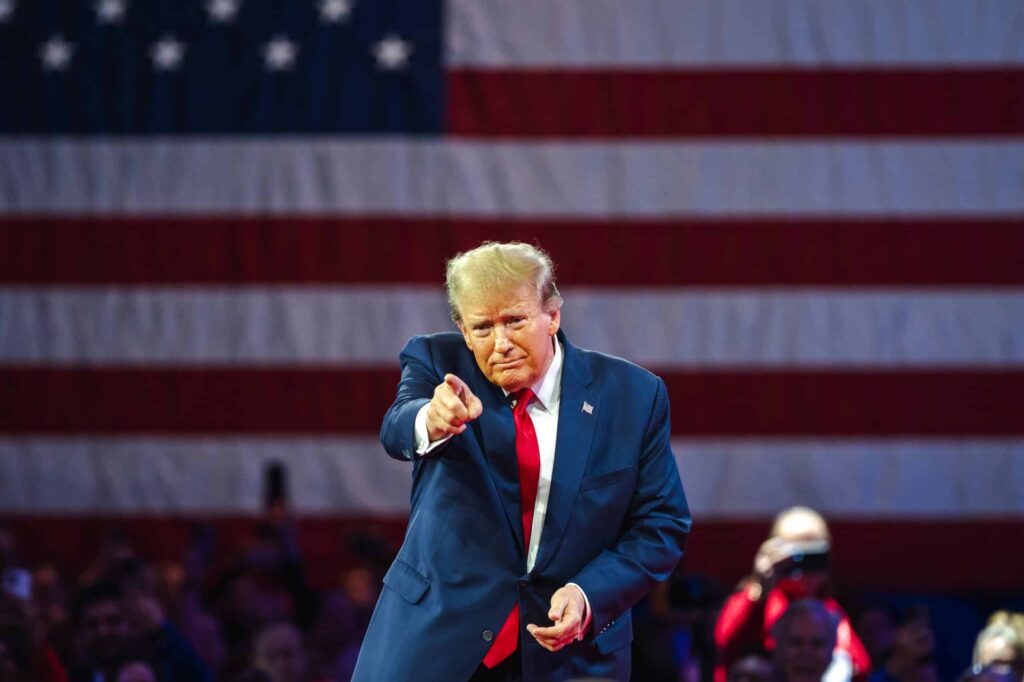
Trump is positioning himself as the pro-crypto candidate, but what might be more significant is what his wider economic policies might mean for the attractiveness of crypto.
The “Trump Trade” is gaining traction among investors as Trump positions himself as the pro-crypto candidate
(Shutterstock)
Posted July 17, 2024 at 3:37 pm EST.
The “Trump Trade” has been a focus among investors ever since former President Donald Trump became the Republican nominee for the upcoming US elections. But it gained even more traction last Saturday when Trump survived an assassination attempt during a rally, with a bullet grazing his right ear.
Traders at prediction market Polymarket now predict a 70% chance that Trump will win against Joe Biden, versus 60% prior to the attempt on his life. In the latest Bits + Bips podcast, hosts Alex Kruger and Joe McCann expressed their belief that a Trump victory is now assured after the heroic imagery of the ex-president that emerged from the shooting incident. And according to McCann, “the narrative and perception of what he could do is very influential to [crypto’s] price.”
The “Trump Trade” refers to the market reaction and investment strategy based on the expectation that a Trump presidency will lead to favorable conditions for certain assets, particularly cryptocurrencies, due to his pro-crypto stance and potential economic policies.
Trump as the Crypto Candidate
After previously criticizing cryptocurrencies, Trump has now been positioning himself as the crypto candidate. In May, he became the first major presidential candidate in American history to accept cryptocurrency donations. He is scheduled to speak at next week’s Bitcoin Conference in Nashville, and in a Bloomberg interview on Tuesday, Trump emphasized the need for the U.S. to take the lead in the crypto space before China does and teased a fourth NFT launch.
In addition, Trump has chosen Ohio Senator J.D. Vance as his running mate. Vance disclosed that he owned between $100,001 and $250,000 worth of BTC in 2022, and he’s been vocal in disagreeing with how Gary Gensler has regulated the crypto industry. Therefore, Vance is “probably very good for crypto,” said James Seyffart in the Bits + Bips episode.
Read more: Trump Picking J.D. Vance as Vice Presidential Running Mate Sends Vance Related-Memecoins Soaring
With Trump in the White House, it is expected that the unfavorable regulatory environment for crypto in the U.S. will change. Gensler’s SEC has been very combative towards the industry, largely pursuing regulation by enforcement. A Trump administration could lead to more regulatory clarity and allow for greater innovation. For instance, some people expect that a Solana ETF will be approved under his presidency, following the paths of bitcoin and ether.
Macro Under a Trump Presidency
But there’s more than just Trump’s pro-crypto views behind the optimism among crypto investors about a second Trump presidency. Trump could well shape the macroeconomic environment in a way that is bullish for crypto.
As Kruger mentioned on the podcast and pointed out on X, Trump’s fiscal policies, including tax cuts and increased government spending, could lead to higher inflation and a steeper yield curve. This environment often makes crypto more attractive as an alternative investment. Billionaire investor Mark Cuban echoed this sentiment on Wednesday on X, stating, “Lower tax rates and tariffs will be inflationary,” which could drive the price of Bitcoin “way higher than you think.”
More specifically, a Trump-Vance administration could change U.S. economic policy around the strength of the dollar. Both Trump and his running mate have argued that a weaker U.S. currency would better support American exports by making them more competitive globally. This stance contrasts with traditional Republican positions favoring a strong dollar.
A weaker dollar might boost domestic manufacturing and trade balances, but it could also lead to increased inflationary pressures. For the crypto market, that would be a bullish development, as investors often turn to bitcoin and other cryptocurrencies as hedges against currency devaluation. As Cuban noted in his post, “Geopolitical uncertainty and the decline of the dollar as the reserve currency could accelerate BTC prices.”
The U.S. Dollar Index (DXY), which measures the dollar’s value against a basket of other major currencies, has historically moved in the opposite direction as bitcoin and the broader markets. When the DXY falls, indicating a weaker dollar, bitcoin often rises as investors seek alternatives to traditional fiat currencies.
Powered by WPeMatico



